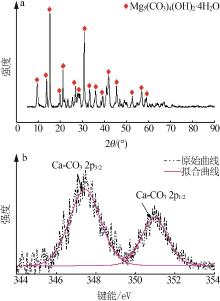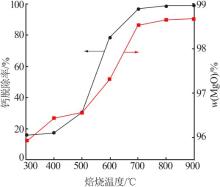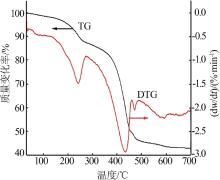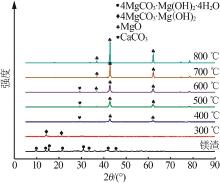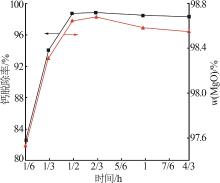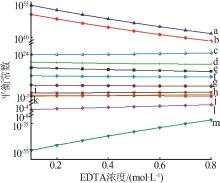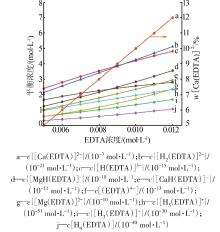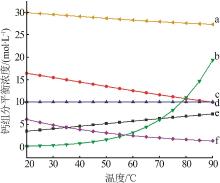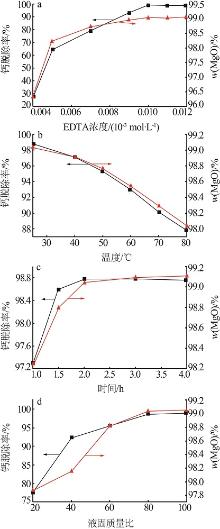| 1 |
刘佳媛.熔盐氯化生产四氯化钛工艺研究[J].现代矿业,2019,35(5):221-225.
|
|
LIU Jiayuan.Research on the process of titanium tetrachloride production by molten salt chlorination[J].Modern Mining,2019,35(5):221-225.
|
| 2 |
廉荣申.浅析四氯化钛工艺技术[J].天津化工,2019,33(4):52-53.
|
|
LIAN Rongshen.Brief Analysis of Titanium Tetrachloride Technology[J].Tianjin Chemical Industry,2019,33(4):52-53.
|
| 3 |
王超超.水氯镁石制备高纯氧化镁和碱式硫酸镁水泥研究[D].太原:山西大学,2020.
|
|
WANG Chaochao.Study on preparation of high purity magnesium oxide and basic magnesium sulfate cement with bischofite[D].Taiyuan:Shanxi University,2020.
|
| 4 |
赵福军,张浩波,吴中平,等.老卤-碳铵法制备高纯氧化镁研究[J].无机盐工业,2021,53(9):57-60.
|
|
ZHAO Fujun, ZHANG Haobo, WU Zhongping, et al.Study on the preparation of high purity magnesium oxide from residual brine and ammonium bicarbonate[J].Inorganic Chemicals Industry,2021,53(9):57-60.
|
| 5 |
郗悦.西藏地区某低品位水菱镁矿石提纯研究[D].鞍山:辽宁科技大学,2020.
|
|
XI Yue.Study on purification of A low-grade hydromagnesite ore in tibet area[D].Anshan:University of Science and Technology Liaoning,2020.
|
| 6 |
MA Xiaohong, LU Yunhua, DANG Li, et al.Effects of polyether titanate coupling agent on the flame retardancy and mechanical properties of soft poly(vinyl chloride)/basic magnesium carbonate composites[J].Polymer Composites,2020,41(9):3594-3605.
|
| 7 |
王余莲,印万忠,李闯,等.碱式碳酸镁的表面有机改性及性能表征[J].硅酸盐学报,2020,48(1):120-127.
|
|
WANG Yulian, YIN Wanzhong, LI Chuang, et al.Surface organic modification and characterization of hydromagnesite[J].Journal of the Chinese Ceramic Society,2020,48(1):120-127.
|
| 8 |
王国胜,王迪,张天天.利用硼酸母液制备碱式碳酸镁并用于母液除铁的研究[J].无机盐工业,2017,49(5):61-63.
|
|
WANG Guosheng, WANG Di, ZHANG Tiantian.Preparation of basic magnesium carbonate from boric acid mother liquor and application in removing of iron ions in mother liquor[J].Inorganic Chemicals Industry,2017,49(5):61-63.
|
| 9 |
LEI Hong, WEI Yu, HUANG Zhiliang, et al.Preparation of flowerlike porous Mg5(CO3)4(OH)2·4H2O by CO2 bubble templating[J].IOP Conference Series:Materials Science and Engineering,2018,389.Doi:10.1088/1757-899x/389/1/012032.
doi: 10.1088/1757-899x/389/1/012032
|
| 10 |
白云山.白云石、菱镁矿生产高纯度碳酸镁和氧化镁新工艺研究[D].西安:陕西师范大学,2005.
|
|
BAI Yunshan.Study on new techniques to produce high purity magnesium carbonate and magnesia from magnesite and dolomi-te[D].Xi'an:Shaanxi Normal University,2005.
|
| 11 |
LEI Sihua, GAN Yu, CAO Zhanfang, et al.The preparation of high purity MgO and precision separation mechanism of Mg and Ca from dolomite[J].Mining,Metallurgy & Exploration,2020,37(4):1221-1230.
|
| 12 |
韩文祥.微波对三水合碳酸镁结晶动力学影响的研究[D].天津:天津科技大学,2017.
|
|
HAN Wenxiang.Study on the effect of microwave crystallization kinetics of nesquehonite[D].Tianjin:Tianjin University of Science & Technology,2017.
|
| 13 |
甘宇,曹占芳,王帅,等.白云石碳化法制备高纯氧化镁[J].轻金属,2019(6):44-49.
|
|
GAN Yu, CAO Zhanfang, WANG Shuai, et al.Preparation of high purity magnesium oxide by carbonization from dolomite[J].Light Metals,2019(6):44-49.
|
| 14 |
刘嘉琦,王余莲,崔佳,等.利用菱镁矿碳化残渣制备花状碱式碳酸镁晶体[J].沈阳理工大学学报,2019,38(1):11-15.
|
|
LIU Jiaqi, WANG Yulian, CUI Jia, et al.Preparation of flower-like hydromagnesite crystals from carbonized magnesite residue[J].Journal of Shenyang Ligong University,2019,38(1):11-15.
|
| 15 |
郭丽莉,李振,王晓民,等.水氯镁石和高钙菱镁石制备氢氧化镁[J].有色金属:冶炼部分,2022(1):103-107.
|
|
GUO Lili, LI Zhen, WANG Xiaomin, et al.Preparation of magnesium hydroxide from bischofite and high-calcium magnesite[J].Nonferrous Metals:Extractive Metallurgy,2022(1):103-107.
|
| 16 |
郑利娜,余红发.白云石碳化制备碱式碳酸镁的新钙镁分离方法[J].材料科学与工程学报,2017,35(4):570-574.
|
|
ZHENG Lina, YU Hongfa.Novel method of calcium and magnesium separation in preparation of basic magnesium carbonate with dolomite by carbonation[J].Journal of Materials Science and Engineering,2017,35(4):570-574.
|
 ),XU Tongfei1,HUANG Ziliang2,CHEN Zhipeng1,LIU Xudong3,YI Meigui1(
),XU Tongfei1,HUANG Ziliang2,CHEN Zhipeng1,LIU Xudong3,YI Meigui1( )
)
